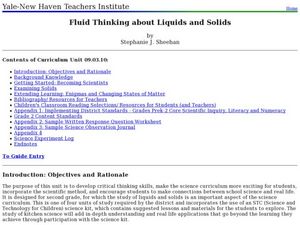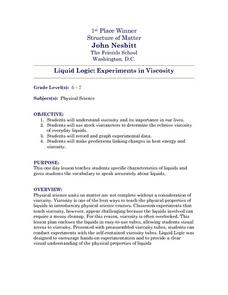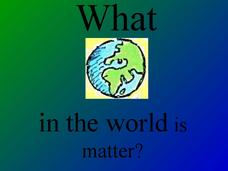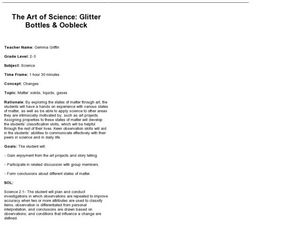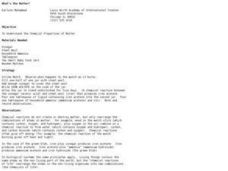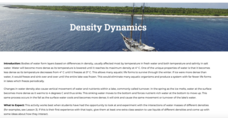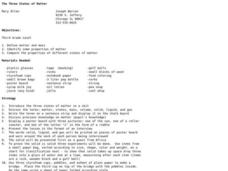Curated OER
Fluid Thinking About Liquids and Solids
Second graders examine the physical characteristics of the different states of matter. In this chemistry lesson, 2nd graders observe how matter changes from one phase to another. They classify substances according to its type of matter.
Curated OER
Liquid Logic: Experiments in Viscosity
Middle schoolers examine specific characteristics of liquids through a hands-on lab activity. An experiment with teacher prepared viscosity tubes is conducted in which liquid identities are predicted based on data. A hypothesis is...
Curated OER
What in the World is Matter?
How does matter change and what are its properties? This presentation is a bit scattered and attempts to infuse humor in place of concrete definitions. In order to make this worthwhile for classroom use, you will need to add to it.
Curated OER
Properties of Matter
Third graders explore forms of matter through reading, hands-on science activities, and research using the Internet. Students create a booklet, directions given, that they title and decorate, to later serve as a review visualization...
Teach Engineering
Density and Miscibility
The liquids did not mix — so what do density columns have to do with it? The seventh part in a series of nine provides the theoretical explanation of why density columns do not mix. The lesson covers the topics related to...
Curated OER
The Art of Science: Glitter Bottles and Oobleck
After having a class discussion on the three states of matter, young scientists utilize the wonderful substance, Oobleck in order to experience something that changes states of matter. They also create "sparkle jars" which...
Kenan Fellows
Density
Most scholars associate density with floating, but how do scientists determine the exact density of an unknown liquid? The third lesson plan in a seven-part series challenges scholars to find the mass and volume of two unknown liquids....
Curated OER
Cup Capacity Tool: Measuring Cup
Students examine containers and their capacity. They fill a one-cup measuring cup with water and pour cups of water into other containers. Through observation, students discover how many cups make a pint, and how many teaspoons make a...
Curated OER
Physical Science: Festival of Bubbles
Investigate bubbles through the use of scientific inquiry. Pupils blow bubbles using several methods and measure the resulting bubble print. Measurements are recorded on a data table and transferred to a bar graph. Results are discussed...
Science Geek
Periodic Table of Elements
Colored boxes with white font present the basic periodic table of elements to your young chemists. All of the basics are included: chemical name, symbol, atomic number, atomic mass, and the number of electrons in each orbital. A brief...
Curated OER
What's the Matter? (Living and Non-Living Things)
Understand how chemical reactions recombine atoms to create the "chemicals of life". An experiment, showing the basic chemical reactions of an iron nail or a match, helps young children start their understanding of permanent changes.
Curated OER
Density Dynamics
Students set up working models demonstrating lake turnover and the formation of deep water masses in the oceans.
Curated OER
Gasoline Additive
Chemists consider a situation in which an ethanol producer needs to determine how much to add to t-butanol to prevent freezing during transport. They work in the laboratory to obtain the freezing point depression constant for the...
Curated OER
Sink or Float?
Have your class explore density and buoyancy using this resource. Learners read the book Who Sank the Boat, and use several items, such as rubber balls, bottle caps, wood, and other household items to conduct an experiment. Using a tub...
Cornell University
Unknown Powders
Create a little scientific magic within your classroom! Learners mix powders and liquids and identify chemical reactions. Based on the reactions, individuals determine the identity of various powders.
Beyond Benign
Sublimation
Ah, caffeine! What would some of us do without it? Teach your high school chemistry class the concept of sublimation as they complete a hands-on experiment to visualize the changes caffeine undergoes during heating and cooling....
American Chemical Society
Forming a Precipitate
Things are getting a little slippery in an inquiry-based lesson studying precipitates. Learners use soap and Alka-Seltzer tablets to create different mixtures with water. They then study the properties of the mixtures including their...
Curated OER
Matters of Milk and Marshmallows
Young scholars observe a teacher demonstration o classifying matter by its physical properties of shape and size. After discussing the definition of matter, students describe the state of matter. They sing a song to the tune of "Bingo."...
Curated OER
Water and Ice
Learners observe and discuss what happens when water turns to ice and when ice turns into water. In this freezing and melting lesson plan, students observe ice and water and complete hands on activities that change their properties.
Curated OER
Science: Liquid Matter
Second graders examine the properties of liquids and their classifications. They compare and contrast cups of different liquids and record their findings in journals. Students observe how liquids flow at various speeds and that unlike...
Curated OER
It's a Matter of Change
Students watch a video on matter and identify examples of solids, liquids and gases in the classroom. They discuss the attributes for each kind of matter and conduct an experiment to explore how matter can change form.
Curated OER
Teaching Matter with The Wild Christmas Reindeer
Second graders learn the proper way to take measurements, explore the properties of objects and expand their vocabulary.
Curated OER
The Three States of Matter
Third graders identify properties of solids, liquids, and gasses. In this states of matter lesson, the teacher demonstrates the properties of each state of matter, then students go on a scavenger hunt for items to represent each state...
Curated OER
What's the Matter?
First graders identify solids, liquids, and gases. In this matter lesson, the teacher guides students through numerous demonstrations as they determine the properties of solids, liquids, and gases and classify things as each. As the...


